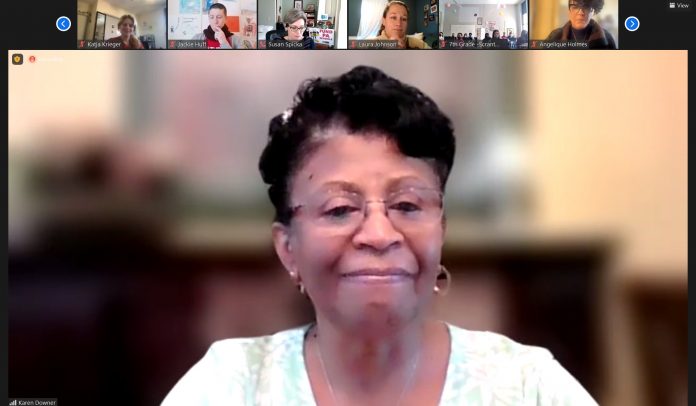Karen Downer, president of NAACP Bucks County, has visited school districts located at both ends of the county.
And there’s a striking difference.
“In Upper Bucks, I was amazed at the beautiful buildings, large classrooms, wonderful libraries, stadiums, gyms and auditoriums. I knew there was a difference between Upper and Lower Bucks and that Upper Bucks has a higher tax base,” said Downer. “You would be shocked to know that of the 13 school districts in Bucks County, only three are funded at capacity. In Bucks County, school funding ranges from $30,144 per student in the New Hope-Solebury district, to $14,613 per student in Bristol Borough.”
Downer was one of many to speak out against unequal education funding in Pennsylvania during a recent virtual rally. The event, which took place via Zoom last Tuesday afternoon, was meant to raise support for the current lawsuit brought forth by six school districts, parents and other stakeholders.
In short, the plaintiffs are arguing that public education funding is in violation of the state constitution because it’s so inequitable. Districts in affluent neighborhoods are receiving higher amounts of funding than those in low-income areas with largely minority students. This imbalance, they say, is resulting in lower test scores and less opportunities post-graduation.
“We need to address systemic racism and poverty as tangible barriers to learning and future achievement,” added Downer. “We want the court to direct the state to create and maintain a constitutional school funding system that enables all students to receive the resources they need to meet Pennsylvania’s state standards.”
The virtual rally was moderated by Susan Spicka, executive director of Education Voters of PA, who recounted a number of shocking stories heard during the testimony of students, staff and parents in underserved school districts.

From 125 elementary schoolers forced to share one bathroom, to a teacher doing her best to make a concrete, cinder block closet with no ventilation an inviting learning space for kids, the situation is dire in many areas across Pennsylvania.
However, the occurrence that stood out most in Spicka’s mind came during the questioning of Matthew Splain, superintendent of the Otto-Eldred School District in McKean County. John Krill, a lawyer for Senate President Pro Tempore Jake Corman, shared his belief that academic standards don’t matter for some students. He asked, “What use would someone on the McDonald’s career track have for Algebra 1?” Krill added that there’s a “need for retail workers, for people who know how to flip a pizza crust.”
“They’re actually arguing that they have no obligation to ensure that students have access to any high-quality education that prepares them for college or careers because we have a need in the commonwealth for people to do jobs that are low-wage jobs. Why should the state bother to pay to educate them?” said Spicka. “This is what we’re up against. We are up against lawmakers who would never allow their children to learn in the conditions we are hearing about.”
Phil Daniels, board president of the Norristown Area School District, said that while neighboring districts are constructing brand new buildings, Norristown is just now able to replace the original cafeteria in the high school that dates back to 1972.
“It’s not complicated,” he said. “Every child in this commonwealth deserves the same quality of education no matter their zip code. Fix this now. Show me the money.”

Angelique Hinton, president of the Greater Norristown NAACP and executive director of PA Youth Vote, revealed that when her son was in eighth grade, he wasn’t given homework one day because there weren’t enough textbooks to send home with all of the students.
“No matter how hard the teachers and the administrators might try, there’s just never enough resources to meet the needs of the students,” said Hinton, who also stressed a lack of afterschool programs at many districts. “This often negatively impacts the trajectory of their careers and earning potential. It could harm them and their families for years to come financially.”
Holly Meade, a seventh grade teacher at Northeast Scranton Intermediate School, explained how two science teachers have to share four microscopes between their two classes.
Jennifer Hoff, a 14-year school board director with the William Penn School District, one of the plaintiffs in the case, expressed her hatred that children are being “defined by their parents’ finances from the beginning.”
“That’s not acceptable that these children are not treated like every other child. It’s pretty deplorable,” she said. “This is a civil rights court case, right? This is about the rights of students and their right to an education. We know these students can learn. We know they come from less finances and we know what we can do to help them.”
Amy Kobeta, communications director for Children First, concluded the rally with a rousing chant of, “Show us the money!”
The case, which is being heard by Commonwealth Court Judge Renee Cohn Jubelirer, is slated to continue for the next several weeks. It began over two months ago, with concerned residents hailing from Bucks County and across the state traveling to Harrisburg to make their voices heard.
More information can be found at fundourschoolspa.org.
Samantha Bambino can be reached at [email protected]


